US Special Envoy Elan Carr to be fêted as Gulf kingdom leads way to teaching tolerance in sea of anti-Semitism
Seeking to advance projects with the United States that promote respect and cooperation among the various religions, the King Hamad Global Center for Peaceful Coexistence in Bahrain will be signing a memorandum of understanding with the United States in Manama next month. US Special Envoy to Monitor and Combat Anti-Semitism Elan Carr, representing the Americans, will be honored at the event.
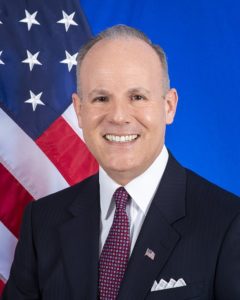
US Special Envoy to Monitor and Combat Anti-Semitism Elan Carr (Courtesy)
“Bahrain, under the leadership of His Majesty King Hamad bin Isa Al Khalifa, has made it a top priority to build a better and more tolerant Middle East,” Carr told The Media Line.
“Bahrain recognizes that anti-Semitism is not only evil but that it inflicts a terrible toll on the societies that embrace it,” he continued. “I am grateful to the King Hamad Global Centre for Peaceful Coexistence for proposing this collaboration with my office to fight anti-Semitism, especially in the Arab and Muslim world, and promoting mutual respect and affection between the peoples and religions of the Middle East.”
The center is looking to focus on youth empowerment, which includes the sharing of faith stories, interfaith dialogue, training programs and a series of events planned around the world, including at the United Nations General Assembly, according to Betsy Mathieson, deputy chairperson of the center.
“The aim is to stop abuse and discrimination of all faiths in the spirit of love and respect, which is vital for a peaceful world,” she explained to The Media Line.
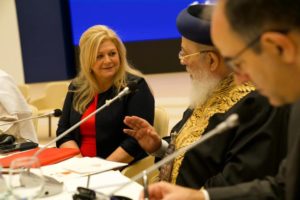
Betsy Mathieson is shown in conversation with former Israeli chief rabbi Shlomo Amar in Bahrain. (Courtesy)
Smallest of the Middle Eastern countries, at a mere 293 square miles, and inhabited by a population of just 1.5 million, Bahrain has led the region’s path toward tolerance for centuries. Mathieson credits the king as saying that Bahrain has been a sanctuary for those escaping religious oppression since the Nestorian Christians were persecuted by the Byzantine Empire between the fourth and seventh centuries.
“Bahrain was a haven in those days, and remains that way today,” she said.
Shaikh Khalid bin Khalifa Al Khalifa, chairman of the board of trustees of the center and a distinguished historian, told The Media Line that the evidential history of religious tolerance in Bahrain cannot be denied.
“Some countries make tolerance and peaceful coexistence centers to have the peaceful coexistence in their countries,” he said. “Bahrain is just the opposite. We have had peaceful existence for many years – hundreds of years – and we would like to reflect this to the world through our center.”
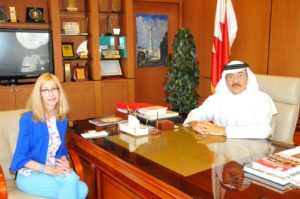
Felice Friedson, president and CEO of The Media Line, meets with Shaikh Khalid bin Khalifa Al Khalifa, chairman of the King Hamad Global Centre for Peaceful Coexistence, at his office in Manama, Bahrain. (TML photos)
Khalifa has served on Bahrain’s Shura Council, or parliament, and has headed its Foreign Affairs, Defense and National Security Committee.
“I myself studied in a Christian school. Nobody at the time asked why a Muslim boy would study in a Christian school, so that’s why it is part of our lives, a part of our society,” he related.
“From a religious point of view,” he went on, “we have no differences. There is no conflict at all. We have lived with Jews in Bahrain for many years as neighbors. I had my neighbor, Ezra, when I was a child. He came to my house and we ate together. I remember that even when I was small – I mean when I was young, a child – they said about this Ezra, ‘He’s a Jew!’ And I didn’t know what ‘Jew’ meant. In fact, I didn’t know what Muslim meant. So, that’s what I think: Separate religion from politics and you’ll be safe.”
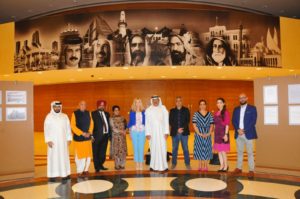
The Media Line joins Sheikh Hamad and other religious leaders to learn about coexistence in Bahrain. (TML photos)
The King Hamad Global Centre is a world leader in promoting religious freedom, interfaith dialogue and peaceful coexistence as a means to combat terrorism, extremism, violence and hate, spearheading events from Windsor Castle to the United Nations. It is headquartered in the Isa Cultural Center Complex, a majestic spiritual hub for young people, academics, diplomats, religious leaders and NGOs.
Last September, the King Hamad Chair for Interfaith Dialogue and Peaceful Coexistence was established at Italy’s Sapienza Università di Roma with the objective of providing fundamental instruments, methods and skills in order to critically study the interactions between religions from the point of view of peaceful coexistence.
Back in Bahrain, Shushil Mujimal is dressed in colorful Hindu garb. He is chairman of the kingdom’s Bhatia community, which celebrated 200 years in 2019, and chairman of its Hindu Temple.

Shushil Mujimal, chairman of the Hindu Temple, speaks to The Media Line about his heritage in Bahrain. (TML photos)
He shares the community’s history with The Media Line.
“Before, Bahrain was British-protected, and much of my family used to come here regularly by boat. And there was no visa requirement or anything like that. They would come to Bahrain, do business, take some items from here [and] sail to India,” Mujimal relates.
“In time, they established one small temple with the permission of the king. It was almost 200 years ago. They said you can do whatever you want. You are at liberty and nobody will take anything, and this is my permission to you,” he says.
“We will remember this because these words were told by my grandfather to me, and to him by his grandfather, that Bahrain is a place where you can live peacefully, without any fear,” he states. “Although we are Hindu and [others] are Muslim, I feel they have welcomed us to do whatever our rituals say. And since then, I think the Hindu community has swelled to more than 150,000 people in Bahrain.”
The Sri Krishna Temple is in the midst of a $4.2-million renovation. It brought Prime Minister Narendra Modi of India to Manama on his first official visit.
More than half of the kingdom’s population is made up of expats from more than 100 countries. The streets are lined with hundreds of mosques, Sunni and Shia interwoven. There are churches of an array of denominations along with Hindu, Sikh and Buddhist temples, as well as a synagogue that services a tiny Jewish community that is hard-pressed to total 40 people.
On October 10, 2017, King Hamad bin Isa Al Khalifa issued a Kingdom of Bahrain Declaration [1] that prominently states, in his words: “Ignorance is the enemy of peace. It is therefore our duty to learn, share and live together by the tenets of faith in the spirit of mutual respect and love.”
Mathieson tells The Media Line that the king wanted to pen a document that would “preserve Bahrain’s culture and heritage, particularly when it comes to peaceful coexistence and the right of all people from around the world to come to Bahrain to worship unhindered and safely.”
Rabbi Marvin Hier, dean and founder of the Simon Wiesenthal Center, told The Media Line that he and others in a delegation had the honor of meeting HRH King Hamad at his palace.
“We found an Arab leader outspoken in his hopes of forging a new path in relations with the Jewish world,” Hier said.
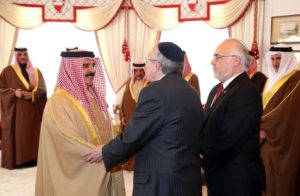
Rabbi Marvin Hier (center) and Rabbi Abraham Cooper (right) of the Simon Wiesenthal Center meet with King Hamad bin Isa Al Khalifa in Manama, Bahrain in February 2017. (Courtesy)
“That led to a remarkable historic declaration on religious tolerance under his name, which was launched in Los Angeles by his son, Prince Nasser, who, along with myself, was the first of 400 interfaith leaders who signed the declaration,” he stated.
Hier notes that there were three anthems sung at the Beverly Wilshire Hotel that morning: “In addition to the Bahraini anthem came the Star-Spangled Banner and Hatikva, the Israeli national anthem.”
Rabbi Abraham Cooper, associate dean and director of global social action for the Wiesenthal Center, signed the declaration at an event in Mumbai.
Upon meeting King Hamad, Cooper asked him if he would allow Bahrainis to visit Israel.
“Two years ago, I hosted 24 interfaith leaders from Bahrain in Jerusalem,” he told The Media Line. “The launch of the global Tolerance Center under the leadership of Sheikh Khaled was the next logical move.”
Subsequently, Cooper approached Carr, the US special envoy, with the suggestion that “best practices” be added to his difficult mandate of combating anti-Semitism. He brought Carr and Bahraini leaders together to discuss the possibility that the kingdom would be the perfect candidate to be the first to enter into a special relationship with the US.
“Bahrain is crucial to US goals in the region of isolating the Iranian regime and promoting ties with its ally, Israel. All Bahraini gestures and moves vis-à-vis the Jewish world are closely monitored by Saudi Arabia and encourage moderates to push forward against religious fanatics. Finally, Bahrain is a religiously tolerant Arab nation and a role model for all Arab and Muslim nations,” Cooper told The Media Line.
“And here we are,” he added.
“It is remarkable that the progress we have made over the past few years is now where we can point to [Bahrain], an Arab country, that emerges as a paradigm of religious tolerance, so much so that [during] a recent economic forum, Rabbi Hier led the first prayer service at the synagogue in Manama since 1948,” Cooper said.
Last year, the King Hamad Centre signed a memorandum of understanding to advance religious freedom. In so doing, it became the first Middle Eastern country to partner with the Religious Freedom and Business Foundation, and the International Religious Freedom Roundtable, both based in Washington, as part of a coalition of businesses for the protection of religious freedom specifically encouraging the private sector to protect people of all faiths and beliefs in the workplace.
Bahrain was also the first Arab state to reach tier 1 status [4], meaning a country making the maximum effort, in the US State Department’s Trafficking in Persons Report. It signed a memorandum of understanding to assist in the building of a UN office for training in drugs and crime for the Middle East and North Africa.
Sheikh Hamad, the king, looks to his neighbors, as he sees Bahrain encouraging other Mideast nations and beyond, to work toward peaceful coexistence.
“They went, like us, to the United States – especially the UAE, Saudi Arabia and other countries. I think this is the right way. We encouraged them,” he said. “Regionally speaking, the Arab world needs to set an example.”